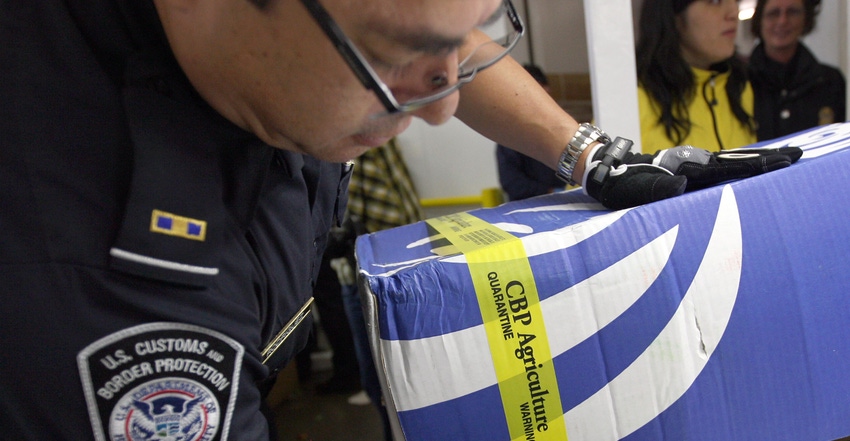October 28, 2019

The Senate unanimously approved the Protecting America’s Food & Agriculture Act of 2019 on Oct. 24.
The bill is designed to ensure the safe and secure trade of agricultural goods across our nation’s borders by authorizing U.S. Customs and Border Protection to hire additional inspectors, support staff and canine teams to fully staff America’s airports, seaports and land ports of entry. It is sponsored by Sens. Gary Peters, D-Michigan; Pat Roberts, R-Kansas; John Cornyn, R-Texas, Debbie Stabenow, D-Michigan, Tina Smith, D-Minn., Chuck Grassley, R-Iowa, and Joni Ernst, R-Iowa.
It was introduced July 11 in the Senate and next heads to the House. The bill authorizes the annual hiring of 240 Agricultural Specialists a year until the workforce shortage is filled, and 200 Agricultural Technicians a year to carry out administrative and support functions. The bill also authorizes the training and assignment of 20 new canine teams a year, which have proven valuable in detecting illicit fruits, vegetables and animal products that may have otherwise been missed in initial inspections. Finally, the bill authorizes supplemental appropriations each year to pay for the activities of the agriculture specialists, technicians and canine teams.
“Agriculture is a critical economic driver in Michigan and across the country, but longstanding shortages of agricultural inspectors limits Customs and Border Protection’s ability to prevent pests, diseases and other dangers from entering our country and puts production at risk,” Peters said. “Every day, millions of passengers and tens of thousands of shipping containers carrying food products cross our nation’s borders, any one of which could do significant damage to America’s food supply and agricultural industries.”
“By strengthening the agricultural inspector workforce at the border, American agriculture and our entire food system will be safer,” Roberts said.
A recent study credited U.S. Customs and Border Protection from keeping the African swine fever virus from entering the United States.
What does CBP do?
The USDA and CBP work together to facilitate the safe and secure entry of agricultural goods into the U.S. The program’s Agricultural Specialists and canine units conduct inspections of passengers, commercial vessels, trucks, aircraft and railcars at U.S. ports of entry to protect health and safety by preventing the entry of harmful goods and invasive species that may pose a threat to American food and agriculture. On a typical day, those inspectors process more than 1 million passengers and 78,000 truck, rail and sea containers carrying goods worth approximately $7.2 billion. According to CBP estimates, there is a shortage of nearly 700 inspectors across the country
Source: U.S. Senate Committee on Homeland Security and Governmental Affairs, which is solely responsible for the information provided and is wholly owned by the source. Informa Business Media and all its subsidiaries are not responsible for any of the content contained in this information asset.
You May Also Like




